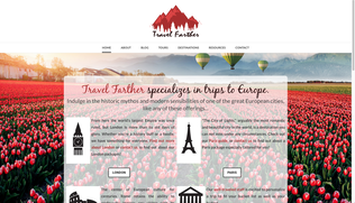 Our 'Travel Farther' theme Our 'Travel Farther' theme A web site is a great marketing tool for your travel agency – if anyone can find it. Let's discuss how to drive traffic to your site and how to properly cross pollinate with your other marketing efforts, combine it with a bit of search engine marketing and throw in some good social media techniques as well. Soon, you will be driving more high quality traffic to your website and getting a better return from your website investment. Firstly, let’s look at your web site’s URL – its domain name. Your domain name should echo and reinforce your brand. Without a doubt, it has become much more difficult to obtain a good URL. However, names are still available with some creative effort and consideration for avoiding some common pitfalls. There are a few common guidelines often cited. Try to obtain either a “.com” or a “.travel” address. If possible, avoid hyphens and underlines. Try to keep the name as short as possible (PS. that advice comes from the publisher of a website with 24 characters in its own URL). However, even violations of these basic rules can be overcome with a strong marketing effort. Your clients should encounter your web address everywhere they encounter your brand. Here is a list of locations where you should ensure your URL is visible:
Each marketing effort you do should cross market your website address. Promoting your site reminds clients that you have a resource where they can turn any time of day for information and research. When you bring new clients into your fold, spend time explaining your website to them. Let them know what resources are available there and how best to utilize it as a resource. Do not assume that the clients will find it on their own or that they will understand how to use it. In fact, soliciting feedback from clients is a terrific way to drive them to explore your website.
Search engine marketing (SEM) refers to a variety of methods like keyword analysis, content optimization, linking strategies, micro sites and other practices to achieve the highest possible search engine visibility. Let me begin by saying that SEM is a topic that has given birth to a vast and thriving cadre of consultants of varying degrees of skill and knowledge. Yet, the basics are not very difficult to comprehend. Search engines like Google and Bing utilize specialized logic, called algorithms, to rank websites by importance and relevancy in relation to a given search term. The more important or relevant a site, the higher the site's URL appears in the results of a search. Most people utilizing a search engine choose the highest rankings on the first page of results to view. SEM techniques, therefore, are designed to make a given site look as relevant as possible to targeted search terms so that the site will rank high on search engine result pages. Search engine marketing strategies are many, but fall into two distinct categories: paid and organic. The easiest, and most expensive, way to make your site's URL appear at the top of any given results page is to pay for it to be there. Companies bid on specific key search terms or "keywords" and pay for their URL to be listed at the top of the results page generated by the paid-for term. Organic search engine marketing, by contrast, is planning a web site in such a manner to make it match the criteria of the search engine algorithms. While the exact logic of any search engine's algorithms is a closely guarded and frequently tweaked secret, it is possible to organically create a site that will naturally fall close to the top of a given search. It is on the principles of organic search, called search engine optimization, or SEO, on which we will focus. Good SEO begins with well-written original content directed at the search terms you most covet, supported by strong, clean HTML code. Content should be written and fine-tuned using sound "keyword analysis". Just as importantly, relevant and appropriate links to your site from other web sites rank high in importance to search engines. Deeper in the inner workings of your site, your URL, TITLE tags and DESCRIPTION tags are important. Contrary to what you may have heard, syndicated or duplicated content does not hurt your SEO, but it does not help it either. Original content is the king of search engine marketing. Your blog posts featuring your specialty and strong keyword analysis is the key to SEO. To the extent the focus of your travel practice is specialized, SEO is more important. A general travel practice cannot easily compete in the world of search engine marketing and the effort to do so is better spent on local marketing efforts. The specialist practice, however, has an opportunity to develop a body of online content unique to the agency and capable of attracting the attention of the search engines. Even the generalist, however, does well to consider search engine optimization techniques for their local market: "Asheville Travel Agency," for example. Finally, let's briefly discuss your social media marketing. Facebook, Twitter, Pinterest, and Instagram drive a lot of traffic to websites and, in fact, are a source of some of the search engine marketing juice we just discussed. Posting interesting content on your site and then posting a link to that content on Facebook will absolutely drive traffic: if, of course, you boost your posts. Need proof? How did you find this article today, the one that brought you to our website? Very likely, you found a link to this article on Facebook, and you are now a part of our website traffic! However, we boosted the post, spent a few dollars, to make that happen. Facebook's algorithms ensure that fewer than 10% of your followers organically see any post you make on your Facebook Business Page. Thus, if you have 100 followers, fewer than 10 will organically see the post. This makes boosting the post a necessary part of Facebook marketing. We have written articles about boosting, and it is one of the surest ways to generate both likes for your Facebook page and traffic to your site. Naturally, you much have great content for this to work well, so let me suggest you view the content Voyager has available in their content library! With a bit of strategic planning, you can absolutely do a superior job of driving traffic to your website. Here is a webinar we conducted recently on the topic that goes into greater depth. Share the knowledge
0 Comments
Your comment will be posted after it is approved.
Leave a Reply. |
AuthorWrite something about yourself. No need to be fancy, just an overview. Archives
August 2023
Categories
All
|
